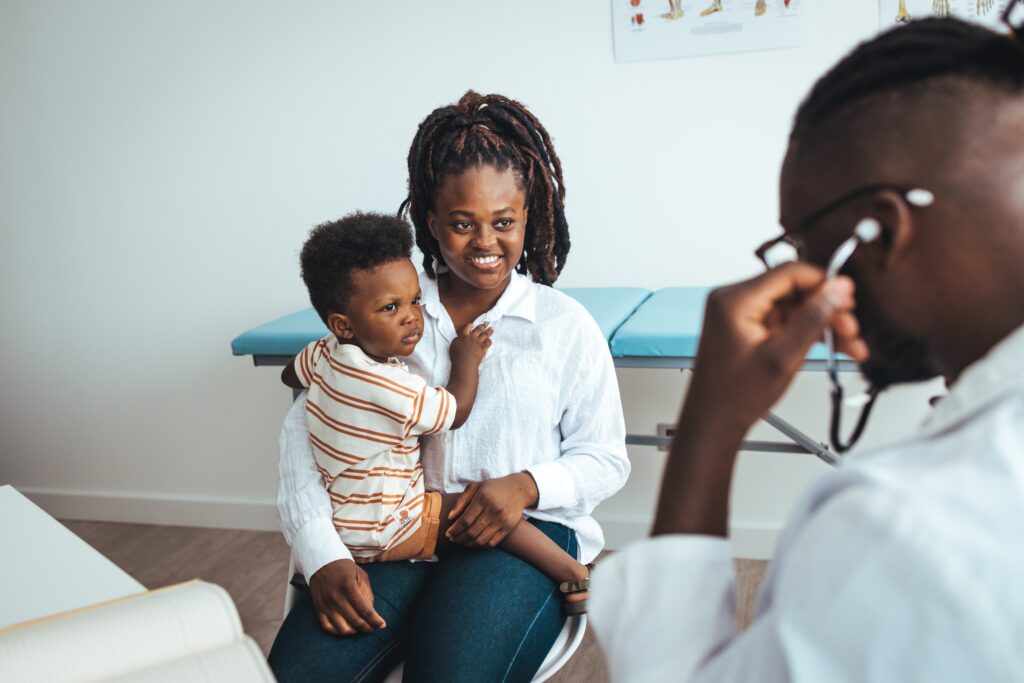In his exam room, Dr. Andrew Swiderski hands his young patient a toy cell phone, encouraging the child to push the buttons that produce various sounds. Then he covers the keyboard with his fingers.
“Usually, a child will look up at me or his parent and say, ‘Why are you doing this?’ He’s made the connection that I interrupted his play,” said Dr. Swiderski, a pediatrician at Open Door Family Medical Center. “A child with autism will instead get mad at my hand. He won’t look at me and doesn’t make the connection that a person is involved.”
This is one of Dr. Swiderski’s “bag of tricks” that comprise the objective 15-minute RITA-T or Rapid Interactive Screening Test for Autism in Toddlers he routinely gives his patients when the diagnosis is suspected. He and his Open Door colleagues use this and the Modified Checklist for Autism Toddlers, or M-CHAT-R, for diagnosis purposes. Waiting for a Developmental Specialist appointment can take six months or more. Additionally, he encourages the parents of his patients to use an app (available in English and Spanish) produced by the Centers for Disease Control that provides a “milestone tracker” for monitoring their child’s development.
Autism is a lifelong condition that is not curable, said Dr. Swiderski. However, like a motor function, speech and language, cognitive, or social developmental delay, early identification and intervention are key. Unfortunately, on average children aren’t diagnosed with autism until four years old, when it could be found as early as one or two years of age.
“Autism is a devastating diagnosis, and many providers are afraid to make it, fearing it labels the patient with a permanent condition that requires the involvement of many specialists and therapists,” he said. “Parents go into a panic. But the pediatrician should be the first to see this, as well as other delays in normal development. The big window is between six months and four years, a critical time to identify and look at this before school starts.”
An ever-increasing number of children are diagnosed with autism (now one in 36 children) not because there is more autism than before, but because of increased awareness and more frequent testing, experts say. Even more – one in six children – experience developmental delays. This is particularly prevalent, said Dr. Swiderski, in the population he sees, many of whom are recent immigrants, speak little if any English, and have limited education. The problem has only been further exacerbated by the pandemic, when many services were limited or not available and isolation prevented children from socializing and integrating with their peers.
“Childhood delays are very prevalent and have lifelong implications, which is why it is so critical to identify and treat them early,” he said. “When caught early they can be overcome through therapy. Unfortunately, it’s not on a lot of parents’ radar. If you don’t catch it, it will affect the child’s integration with his/her peers and school performance. This, in turn, affects their future success in finding employment.”
Pediatricians, he said, represent the “front line” in terms of diagnosing these conditions. At Open Door, they work hand-in-hand with the health care center’s Behavioral Health providers so that these children can be referred to specialists and followed up with, so they don’t fall through the cracks.
Dr. Swiderski estimated that about 90 percent of the delays he and his colleagues see involve communication and language. This, he says, is not because many of his patients come from families where English is not their first language. “I encourage parents to use both languages, which does not “confuse them” or slow down their verbal development. The reason for verbal delays has a lot to do with parents not being aware of milestones. It’s about getting kids to repeat common words and having intellectual exposure throughout the day. An 18-month-old should say 10 words, a two-year-old 50 words and from there their language capacity should explode. At the two-year point, half of their words should be understood by strangers and three quarters by the time they reach three years old. By then, they can learn up to 3,000 words a year. Many parents don’t realize their child is way behind.”
Books and reading are an important component, he said, in preventing delays in speech and communication. Open Door uses Reach Out and Read, a national program, which gives all children between the age of six months and five years a book at each checkup visit.
“The staff reminds parents of the importance of sharing books with their children every day, and where they can get more books,” said Dr. Swiderski. “Books make a gigantic difference. Looking at books with their parents is not just about verbal skills, but about creating bonds. It’s great for setting routines (especially healthy bedtime habits), developing a sense of creativity, and as an ‘antidote’ to electronics. Kids who look at books early are more likely to be readers later.
“We tell parents to take advantage of the preschool years to build verbal skills without delay, and empower them to take a very active role as their children’s ‘first teacher.’ ”




